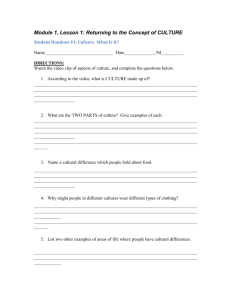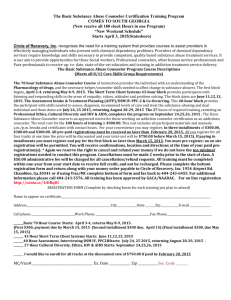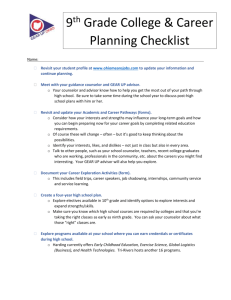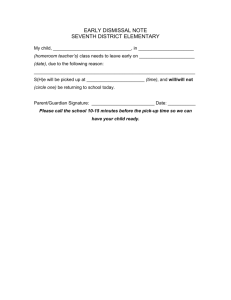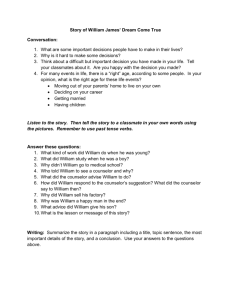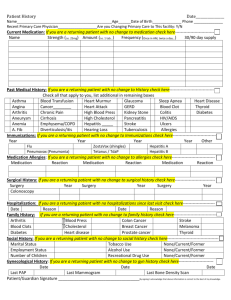Launching Summary The Adventure Begins
advertisement
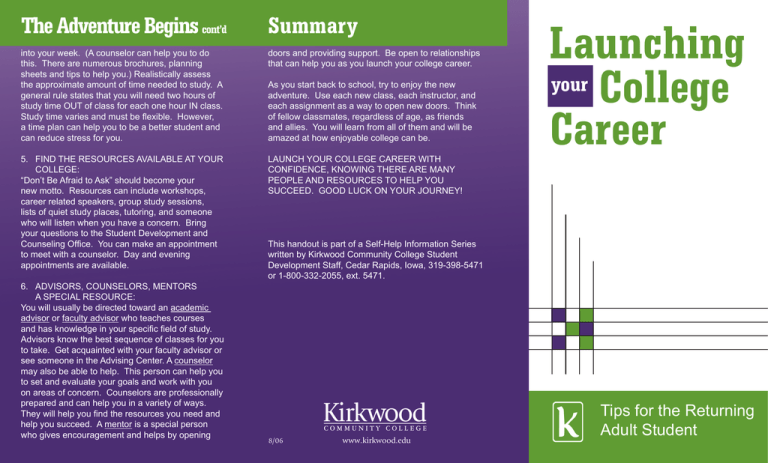
The Adventure Begins cont’d Summary into your week. (A counselor can help you to do this. There are numerous brochures, planning sheets and tips to help you.) Realistically assess the approximate amount of time needed to study. A general rule states that you will need two hours of study time OUT of class for each one hour IN class. Study time varies and must be flexible. However, a time plan can help you to be a better student and can reduce stress for you. doors and providing support. Be open to relationships that can help you as you launch your college career. 5. FIND THE RESOURCES AVAILABLE AT YOUR COLLEGE: “Don’t Be Afraid to Ask” should become your new motto. Resources can include workshops, career related speakers, group study sessions, lists of quiet study places, tutoring, and someone who will listen when you have a concern. Bring your questions to the Student Development and Counseling Office. You can make an appointment to meet with a counselor. Day and evening appointments are available. Launch your college career with confidence, knowing there are many people and resources to help you succeed. Good luck on your journey! 6. ADVISORS, COUNSELORS, MENTORS A SPECIAL RESOURCE: You will usually be directed toward an academic advisor or faculty advisor who teaches courses and has knowledge in your specific field of study. Advisors know the best sequence of classes for you to take. Get acquainted with your faculty advisor or see someone in the Advising Center. A counselor may also be able to help. This person can help you to set and evaluate your goals and work with you on areas of concern. Counselors are professionally prepared and can help you in a variety of ways. They will help you find the resources you need and help you succeed. A mentor is a special person who gives encouragement and helps by opening As you start back to school, try to enjoy the new adventure. Use each new class, each instructor, and each assignment as a way to open new doors. Think of fellow classmates, regardless of age, as friends and allies. You will learn from all of them and will be amazed at how enjoyable college can be. Launching your College Career This handout is part of a Self-Help Information Series written by Kirkwood Community College Student Development Staff, Cedar Rapids, Iowa, 319-398-5471 or 1-800-332-2055, ext. 5471. 8/06 www.kirkwood.edu Tips for the Returning Adult Student Tips for the Returning Adult Student Launching your College Career Welcome to Kirkwood Community College If you have been out of high school for a while, you may be feeling anxious as well as eager about returning to school. This brochure was written with the “returning adult” student in mind, and it will help make your return to college and the classroom a little easier. Remember, you are not alone. There are many returning adult students in college classes. Asking for help and following the suggestions in this brochure will help you along the way. The Advantages of Life Experience GOALS: It is important to define your goals clearly. The maturity you bring to planning your future and the goals you want to achieve as a result of that planning give you a clear advantage. Education is important in today’s world. You may feel forced into retraining in order to succeed in the fast paced work force. Or, you might be pursuing the new career you have always dreamed of. Regardless, you probably can identify several good reasons for returning to school. Returning adult students may wish to meet with an advisor or counselor to clarify goals, career path or other concerns. The Advantages of Life Experience cont’d STUDY SKILLS: Another advantage of the returning adult student is the ability to stay focused. You have learned through work and life experiences the importance of paying attention. This is an essential skill that can only be learned through life’s challenges. Even though you may not have “studied” for a while, you will quickly acquire a variety of study skills. There are a number of helpful resources to assist you in this area. There are classes, workshops, books and brochures that address topics like note taking, test anxiety and study skills. A teacher, counselor or fellow student can also be a valuable resource. The longer you are in school, the easier the learning becomes — even if the class material becomes more advanced. Be patient with yourself and ask someone for assistance if you need it. OTHER ADVANTAGES: The seriousness and motivation of returning adult students are great advantages. You will be amazed at what you can contribute in a college setting. You can use your life experiences for class assignments, understand the reasons behind the course material, and apply the importance of the information to life. Having lived and worked for a few years after high school is a clear advantage. In fact, students with the highest grade point averages are often the returning adult students. As a returning adult student, you have a lot going for you. The Adventure Begins 1. LOOKING FOR THE END RESULT: Do you want a diploma? Do you want a degree? Do you want to transfer to a four-year college? There are many options available. A college degree or diploma may be a personal goal or one needed for employment purposes. Perhaps you want to take classes just for the pleasure of learning. Regardless of your reasons for entering college, it is important to clarify why you are here and where you are heading. 2. EVALUATE OPTIONS AND CHOOSE A PATH: There are many pathways to achieve your goals. Important questions to ask are: How much college is needed? Can I learn necessary skills on the job? Can I work while taking classes? Is certification beyond college required? If you need assistance with these questions and with choosing a pathway, ask an instructor, advisor or counselor. 3. CONSIDER THE COST: Plan the financing of your college career by getting accurate estimates. Most admissions or counseling offices have this information available. Also, remember to include the cost of books, supplies and any equipment that may be needed. These costs can vary greatly. There are many ways to pay for college. You should apply for scholarships, grants and loans through the Financial Aid Office, 205 Kirkwood Hall. You may find more assistance than you expected. 4. ESTIMATE YOUR TIME COMMITMENTS: Sit down with a list of all the activities you MUST do each week such as driving, shopping, work, sleep, meetings, etc. Look for ways to build study time
